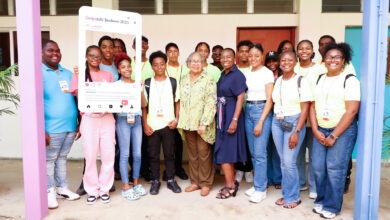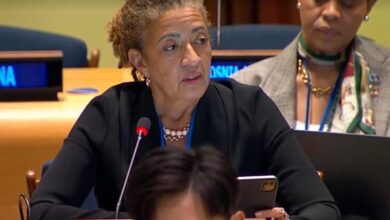THE MORAL AND CIVIC RESPONSIBILITY OF LEADERSHIP
Mr. Secretary-General, I beg you leave to bring greetings to this honorable assembly of distinguished youth and guests on behalf of Mr. Edwin Carrington, Secretary-General of the Caribbean Community. He unfortunately could not be with us today because of other matters concerning this Region. He has enjoined me to offer his warmest regards to one of the most esteemed youth of the Region who has graced us with his presence this afternoon. That youth is none other than the President of Guyana, the His Excellency Bharrat Jagdeo. We know Sir, that your ascendancy to such high political office can only but inspire the youth so gathered here today. It also must inspire those who have followed your meteoric rise to leadership of the Republic of Guyana and your involvement in charting new paths for this Community as we face up to the challenges of a highly competitive world in this era of globalization.
On behalf of the wider Secretariat family, I welcome you all most warmly.
Youth as CARICOM Priority
As we embark on the discussions at this model CARICOM Youth Summit, it is important to note that the Community is entering the new millennium, placing emphasis on achieving a youth agenda that is defined by youth, and for youth. Full recognition is also given to the fact that the future of this Region depends on the preparation of youth for taking up the challenges in a constantly changing world.
The CARICOM Ministers of Youth met for the first time as a group in a ministerial caucus here in Georgetown on 5 October 2000. That caucus addressed the resolutions that were passed by the Caribbean Youth Explosion and Youth Parliament held in Grenada in July 2000. The important point to be noted is that this high policymaking body of the Community was forced to admit that there is need to activate and accelerate a meaningful youth agenda. The Ministers will meet again in 2001 to consider specific challenges and ways in which they could provide the necessary support to implement some of the major priorities.
Among these is a micro-enterprise project to enhance employment opportunities proposed by the Commonwealth Youth Organization. Another is the issue of the under achievement of the young male, one manifestation of this is the startling statistic from the University of the West Indies (Mona Campus) that whereas in 1990 the ratio of male to female graduating with degrees and diplomas was approximately 55% male to 45% female, at the November 2000 graduation, the ratio had changed dramatically: 75% female to 25% male. When this is taken in conjunction with the high number of males between the ages 18- 24 that are incarcerated and the high death rate of young males due to violence (15% in Jamaica), the time for complacency has long passed.
On the other side of the coin there are vexing issues such as:
- Increases in teen pregnancy at an early age (13-15 years)
- Increases in reported violence against young females
- Increases in reported cases of incest, some of which involve juveniles
No wonder HIV/AIDS, another item on your agenda, is so rampant among the youth. According to the CAREC (1999) estimate, one in every five youths between the ages of 15-29 years is likely to die annually, given present trends. Yes – one in every five – unless of course, behaviour patterns and preventive strategies in sexual practices are drastically overhauled. Each of you, each of us has a responsibility to effect this behavioural change, because only in this way do we have hope that most of our youth would live to lead a productive life; only in this way can you, attending this Summit, and your friends and colleagues expect to benefit from the opportunities that present themselves in this New World.
Bertrand Russell the English philosopher expressed his views on social values over 80 years ago and in the context of our time they are still relevant .He said “Without civic morality communities perish; without personal morality their survival has no value”.
The Current Environment: Old Economy/New Economy
The Caribbean is on the verge of giving effect to the Single Market and Economy in 2001. This is one of the items on the agenda of your Summit. We eagerly anticipate your own evaluation and suggestions as to the best strategies and options that make sense to you. This open economic space for goods and services and the movement of people is the essence of the CSME. But the questions are: (a) How can it be fashioned in the best interest of the world that you will have to live in? and (b) What are the processes that would make it possible for you to maintain your national allegiances but think regionally? I only wish to suggest that you consider that we are rapidly transiting from an old economic world to a new economic world order with opportunities as well as risks.
In the old Economy the key to growth was the individual sector. Company value was defined in hard assets: buildings, machines and physical equipment and the old economic theories revolved around land, labor and capital.
In the New Economy the key to growth is the economic web and the diversity that those webs require and create. The invention of the Personal Computer has spawned web products and services. It facilitates e-commerce. The company value in the new economy is seen as human capital, intellectual property, brainpower and heart. The process of corporate transformation has moved focus from muscle to brainpower and is beginning to move to a focus on innovation, creativity and heart. “Globalization and the revolution in information technology have combined to create a new age with an entirely new business reality and entirely new challenges and opportunities” (Gore, at the CEO Summit organized by Bill Gates, May, 1997.)
The creativity that youth bring to the equation of life will find its truest expression in the knowledge industry of the 21st Century. It requires an educational system that interfaces with the newer technology and is reinforced by creative thought. This may best be illumined as the convergence of technological and human capability. Whereas only a century ago sand in an hourglass was used to measure time, now sand is used as silicon chips that power the personal computers. The CSME is CARICOM's response to ensuring that the Region is integrated in this new economy.
Some Challenges arising from the Advent of the New Ecomony
The challenges relate to the need for new skills to cope with the emerging environment. Among these are:
- Access to Education which is at the heart of a technology revolution, especially the field of Information Technology
- Access to communication: instant knowledge of events around the globe
- Access to jobs in an environment
- Redefinition of the workplace: without walls: something that is described on the basis of its functions rather than its structure.
Options for Youth:
Prerequisites to leadership responsibilities are moral and civic responsibilities.
Youth taking Moral Responsibility
Hopefully this Summit will provide you with a sense of connectedness and spirit of confidence. Hopefully it will engender a collective responsibility on your part to assist in making a difference at all levels: the school, the village, the community, the nation and the region.
Youth taking Civic Responsibility
Acts of service are the dues we pay for living in a democracy.
Civic virtue is defined as both the knowledge of what is the public good and the sustained desire to achieve it. Not so long ago in the Caribbean a citizen's responsibility was to engage in healthy debate with one's fellow citizens about the common good and to take responsibility for shaping the destiny of the political community. The national struggles against colonialism and those to achieve independence were once waged by young leaders. Among those in the Region were Burnham/Jagan in Guyana, Manley/ Bustamante in Jamaica, Grantley Adams in Barbados, Maurice Bishop in Grenada, Joshua in St. Vincent and Eric Williams in Trinidad and Tobago for independence. Their struggles for liberty required a genuine knowledge of public affairs and a sense of belonging, a concern for the whole, a moral bond with the community whose future was at stake.
There were many other young leaders throughout the Caribbean who are not as well known or as celebrated, but who responded positively and pro-actively to the challenges faced by their communities. In the 1950s and 60s, many saw education as a way to effect change. There were many community leaders, such as teachers, preachers and farmers, who sought to build others through literacy programmes, teaching a trade, or being involved in 4H clubs, etc.
As you debate the issues at this Summit you need to reflect on the true meaning of what you are advocating. Hopefully you will feel a greater sense of belonging to CARICOM as a Region and are willing to reaffirm that feeling when you return home to your communities. Hopefully you feel imbued with confidence by the positive aspects of our unique culture. Hopefully this translates into a clearer consciousness of your importance and role in making a positive contribution to the society
Youth in Leadership: Training and Opportunities for Leadership
Youth involvement in leadership is an asset, not a barrier, and results in change .We take this opportunity to congratulate the ROTARACT club for providing opportunities for grooming leaders with commitment to the region and with an understanding of the moral and civic responsibilities that accompany leadership. Innovation is a mechanism for reshaping the way we think about the economy and the vocabulary used to describe it. The New Economy is like an ecosystem; for its health it depends on diversity, nutrients and its ability to change and evolve and learn and grow. The new economy looks to the youth for these injections of fresh visions
Leadership Challenges
The future of community leadership in the twenty first century depends on our capacity to develop what have been called “networks of responsibility” – people crossing boundaries and learning to work together.
The Caribbean youth of the 21st century are in a unique position as they are afforded tremendous opportunities to make a difference to the society. Those who have access to the technology available can use it to benefit the ones who do not, those who can read can help the ones who cannot. There are myriad opportunities/challenges presented each day to youth. Each one can teach one. Is there a child you could spend time with, a blind person you could read to, a hospital you could visit? Right where you are, you can make a difference, and it could mean life or death to another person. It is for youth to decide to meet those opportunities/challenges in the confidence that they have a stake in the future. The need for commitment cannot be overstated.
The mantle is being passed from one generation of leaders to the next. Hopefully, Mr. Secretary-General, this Model Summit will inspire you and your colleagues to take it up.





